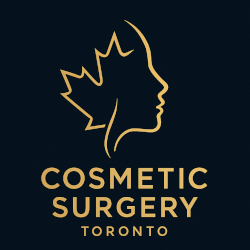Many fitness enthusiasts search for ways to enhance muscle growth, often turning to the best muscle growth peptides, various supplements and compounds. Peptides for muscle growth have become a powerful tool in this quest, offering a natural alternative for building lean muscle mass and improving recovery.
These remarkable compounds are made up of short chains of amino acids, which are the basic building blocks of protein. You can think of muscle growth peptides as messengers in your body, carrying important signals that trigger specific biological responses necessary for muscle growth. They work by stimulating the release growth hormone, enhancing protein synthesis, and speeding up tissue repair.
Amino acids are crucial in this process of building muscle. When you engage in resistance training, your muscle fibers undergo tiny damage. In response, your body initiates protein synthesis, using amino acids to repair and strengthen these tissues. This biological process leads to increased muscle mass and improved strength.
By strategically using growth hormone releasing peptides that stimulate muscle growth, you can amplify these natural mechanisms of muscle-building. Peptides enhance these processes by increasing growth hormone production, improving nitrogen retention, and enhancing the body’s ability to synthesize new protein. This makes them especially valuable for athletes and bodybuilders looking to get the most out of their training results while supporting their body’s natural production of growth hormone.
5 Top Peptides For Muscle Growth
Note: Looking to get started with premium peptides for muscle growth? Check out high-quality options here: Best Peptides for Muscle Growth & Recovery: www.PureRawz.com
We have carefully analyzed well over 75 different peptide therapies for their ability to stimulate muscle growth and have identified the following as the best peptides in their class:
- Sermorelin & Ipamorelin
- CJC-1295
- GHRP-2
- GHRP-6
- IGF1-LR3
Let’s take a look at each one of these best peptides for muscle growth in detail to give you the skinny on what you can expect.
1. Sermorelin & Ipamorelin
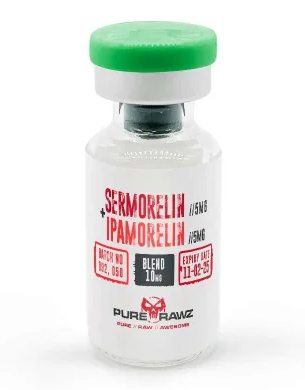
Buy Sermorelin & Ipamorelin Peptide Here
This dynamic duo represents the gold standard in muscle-building peptides. Sermorelin acts as a growth hormone releasing hormone (GHRH) analog, stimulating the natural production of human growth hormone (HGH) from the pituitary gland. This natural stimulation helps maintain steady growth hormone levels, leading to sustained muscle growth and enhanced recovery periods between workouts.
The magic of Sermorelin lies in its ability to promote muscle tone through increased protein synthesis. Athletes using Sermorelin report significant improvements in lean muscle mass while experiencing faster recovery times after intense training sessions. The peptide’s influence on growth hormone production creates an optimal environment for muscle tissue repair and regeneration.
Ipamorelin complements Sermorelin’s effects by acting as a selective growth hormone secretagogue. This means it specifically targets growth hormone release without affecting other hormones, making it one of the cleanest peptides for muscle growth. Its selective nature minimizes potential side effects while maximizing benefits for muscle development.
When combined, these peptides create a synergistic effect that amplifies their individual benefits. The partnership between Sermorelin and Ipamorelin enhances:
- Muscle Mass Development: The dual action increases protein synthesis and nitrogen retention
- Recovery Efficiency: Reduced downtime between training sessions through accelerated tissue repair
- Growth Hormone Production: Natural stimulation of HGH release for sustained muscle growth
- Fat Loss: Enhanced metabolic rate supporting lean muscle mass preservation
This peptide combination has gained popularity among athletes and bodybuilders seeking natural ways to enhance their physique. The sustained release of growth hormone throughout the day creates an anabolic environment conducive to muscle growth and recovery.
2. CJC-1295
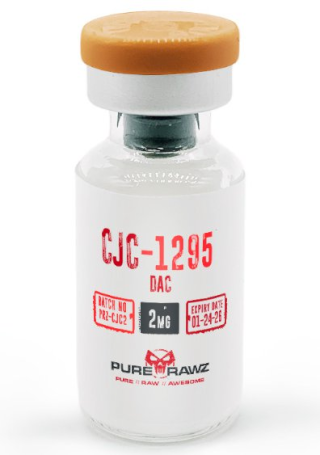
CJC-1295 is a powerful human growth hormone-releasing hormone (GHRH) analog, designed to optimize muscle growth through sustained hormone release. This peptide creates a steady stream of growth hormone and IGF-1 production, maintaining elevated levels for up to a week after administration.
How CJC-1295 Works For Muscle Growth through various growth factors.
The sustained-release mechanism of CJC-1295 sets it apart from other muscle growth peptides. By binding to a drug affinity complex (DAC), it extends the half-life of growth hormone in the bloodstream, providing consistent anabolic effects throughout the day and night.
Benefits of CJC-1295
Users of CJC-1295 report significant improvements in lean muscle mass development, with visible results typically appearing within 4-8 weeks of consistent use. The peptide works by stimulating protein synthesis at the cellular level, creating an optimal environment for muscle tissue growth.
Research indicates that CJC-1295 can increase growth hormone levels by up to 400%, leading to enhanced fat burning and muscle preservation. The peptide’s ability to maintain steady hormone levels helps prevent muscle catabolism during caloric deficits, making it valuable for both bulking and cutting phases.
Combining CJC-1295 with other HGH peptides like Ipamorelin can maximize muscle-building potential. This synergistic approach amplifies the anabolic effects while minimizing potential side effects associated with traditional growth hormone peptide therapy.
3. GHRP-2
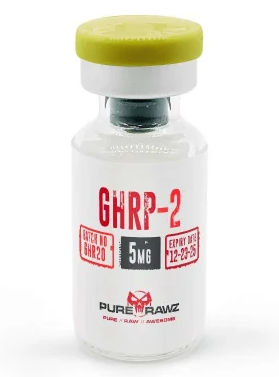
GHRP-2 is a powerful synthetic peptide designed to stimulate natural growth hormone production. It acts as a potent growth hormone secretagogue, triggering significant muscle growth through various pathways.
How GHRP-2 Works For Muscle Growth
The primary way GHRP-2 works is by binding to specific receptors in the pituitary gland, which stimulates a substantial release of growth hormone. This increased growth hormone production leads to enhanced protein synthesis and accelerated muscle tissue development.
Benefits of GHRP-2
Research shows that GHRP-2 has a dual effect on body composition. It promotes the development of lean muscle mass while also aiding in fat reduction through increased metabolic activity. Users often report noticeable improvements in muscle definition within weeks of consistent use.
Here are some key benefits of GHRP-2:
- Increased Growth Hormone Production: GHRP-2 stimulates the pituitary gland to release more growth hormone, which plays a crucial role in muscle growth and recovery.
- Elevation of IGF-1 Levels: When GHRP-2 triggers growth hormone release, it also elevates IGF-1 (Insulin-like Growth Factor 1) production in the liver. This elevation supports muscle cell proliferation and strengthens existing muscle fibers.
- Enhanced Nutrient Partitioning: GHRP-2 helps direct consumed nutrients toward muscle tissue development rather than fat storage, making it particularly effective during bulking phases.
- Improved Muscle Definition: Many users report noticeable improvements in muscle definition and overall physique within weeks of using GHRP-2 consistently.
4. GHRP-6
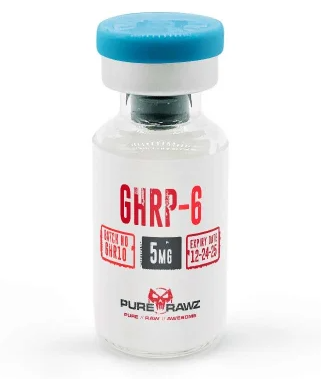
GHRP-6 is a powerful growth hormone-releasing peptide that greatly improves muscle repair and post-workout recovery. It works by directly stimulating the ghrelin receptors in the brain, leading to a significant increase in growth hormone secretion.
Benefits of GHRP-6 for Athletes
- Accelerated Tissue Repair: GHRP-6 has been shown to speed up the healing process after injuries such as muscle strains or tears. By promoting the formation of new blood vessels and increasing blood flow to damaged areas, it delivers essential nutrients and oxygen to injured tissues, creating optimal conditions for rapid recovery.
- Reduced Inflammation: This peptide is effective in reducing inflammation caused by intense workouts. By minimizing swelling and soreness, GHRP-6 allows athletes to bounce back quicker and get back to training sooner.
- Faster Muscle Regeneration: GHRP-6 promotes faster regeneration of muscle fibers after intense exercise. This means that muscles can recover more efficiently and be ready for subsequent training sessions in less time.
- Improved Protein Synthesis: The boost in growth hormone levels resulting from GHRP-6 administration leads to enhanced protein synthesis in the body. This means that muscles can rebuild stronger and bigger after each workout.
5. IGF1-LR3
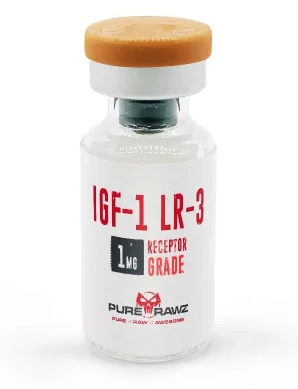
IGF1-LR3 is a powerful peptide variant of insulin-like growth factor 1, designed specifically for muscle development. This advanced peptide has shown great ability in promoting nitrogen retention within muscle tissue—an essential factor for continuous muscle growth and development.
How IGF1-LR3 Works
The unique structure of IGF1-LR3 allows it to stimulate protein synthesis at a faster rate, directly impacting the creation of new muscle cells through a process called hyperplasia. Unlike traditional muscle hypertrophy, which only enlarges existing muscle fibers, this mechanism actually creates brand new ones.
Benefits of IGF1-LR3
Recovery Enhancement: One of the standout benefits of IGF1-LR3 is its ability to activate satellite cells—specialized muscle stem cells that are crucial for muscle repair and tissue regeneration, significantly aiding in muscle growth fat loss . These cells are responsible for the repair and growth of muscle fibers after they have been damaged through intense exercise or injury. By stimulating satellite cells, IGF1-LR3 accelerates the muscle recovery process, helping athletes and bodybuilders bounce back faster after intense training sessions. This means less downtime between workouts and more opportunities for muscle gain and muscle growth.
Nutrient Partitioning: IGF1-LR3 also plays a key role in nutrient partitioning, directing essential nutrients like amino acids into muscle tissue for growth and repair. This process ensures that the body maximizes its ability to build lean muscle mass while preventing the storage of excess calories as fat. For individuals in a calorie surplus trying to build muscle mass, IGF1-LR3 can be particularly effective in promoting muscle hypertrophy without excessive fat gain. Additionally, its ability to stimulate protein synthesis at a higher rate creates an anabolic environment where muscle tissue can grow rapidly.
Increased Hyperplasia: Unlike traditional muscle hypertrophy, which enlarges existing muscle fibers, IGF1-LR3 promotes hyperplasia, the creation of new muscle fibers. This results in increased muscle mass and improved muscle definition over time. By encouraging the formation of new muscle cells, IGF1-LR3 can contribute to a significant transformation in muscle tissue, helping individuals achieve significant gains that go beyond the typical muscle-building effects of other compounds.
Improved Recovery Time: The ability of IGF1-LR3 to increase protein synthesis and promote satellite cell activation directly influences recovery times. This means that after an intense workout, muscles can heal and regenerate more quickly, reducing soreness and inflammation while boosting strength and endurance. With enhanced muscle regeneration, athletes can increase the frequency and intensity of their training sessions, leading to more frequent muscle growth and improved overall athletic performance.
Understanding Peptides for Muscle Growth
Interested in trying these peptides yourself? Browse a curated selection of muscle-growth peptides here.
Peptides are powerful signaling molecules in the body that play a crucial role in muscle development. They work by directly interacting with the pituitary gland, stimulating the natural production of growth hormone (GH). This increase in growth hormone levels creates an ideal environment for muscle growth by promoting cellular repair and regeneration, ultimately enhancing muscle mass and improving overall muscle recovery.
By stimulating the release growth hormone, growth hormone secretion accelerates, leading to the activation of multiple biological processes that are essential for the maintenance and development of muscle tissue. Whether you’re aiming to build lean muscle mass or stimulate muscle growth after an injury, peptide therapy has the potential to be a game-changer.
How Peptides Affect Protein Synthesis
The relationship between peptides and protein synthesis occurs at a molecular level. When specific muscle growth peptides enter the bloodstream, they activate cellular receptors responsible for protein production. This activation leads to increased amino acid uptake by muscle cells, which are essential for building new muscle tissue.
By promoting growth hormone production, peptides create a favorable environment for the body to build and repair muscle tissue more efficiently, while also reducing fat mass . This means that your muscles not only grow in size but also become stronger and more resilient to future stress, leading to increased muscle mass over time.
Benefits of Peptide Supplementation
One of the key benefits of peptide supplementation is its ability to accelerate muscle recovery. These compounds reduce inflammation and enhance blood flow to damaged muscle tissues, delivering vital nutrients and oxygen to recovering muscle fibers. As a result, the healing process after intense workouts is sped up, allowing athletes to train harder and more frequently.
Peptides also play a significant role in preventing muscle breakdown during times of stress or intense training. They help maintain a positive nitrogen balance within muscle cells, preserving existing muscle tissue while supporting the growth of new fibers. This dual action makes peptides especially valuable for athletes and bodybuilders looking to optimize their training results.
The science of muscle growth has evolved beyond traditional supplements, bringing peptides to the forefront of bodybuilding and athletic performance. These powerful compounds offer targeted approaches to muscle development, with specific peptides standing out for their remarkable effects on muscle growth and recovery.
Ready to support recovery, protein synthesis, and lean muscle gains? Find quality peptides here.
The Science of Peptides for Muscle Growth
Research indicates that peptides influence growth hormone secretion, leading to a cascade of anabolic responses in the body. These responses include increased protein synthesis, enhanced muscle repair, and optimized muscle tissue regeneration. The use of growth hormone releasing peptides (GHRPs) or growth hormone releasing hormone (GHRH) analogs plays a crucial role in supporting these processes.
Additionally, elevated gh levels in peptide therapy help in reducing body fat while promoting the development of lean muscle mass. The synergy between growth hormone and muscle growth peptides enables your body to burn fat more efficiently, thereby improving your body composition. Whether you are looking to gain muscle mass or optimize muscle gain, the role of peptides in your fitness regimen cannot be underestimated.
Enhancing Recovery and Athletic Performance with Peptides
One of the biggest advantages of peptide therapy is its ability to accelerate recovery. By promoting the release growth hormone, peptides speed up the repair process of muscle fibers damaged during intense training. As a result, athletes experience reduced joint pain and inflammation, allowing them to recover faster and train more frequently, leading to significant muscle growth and muscle hypertrophy over time.
This rapid recovery also translates to improved physical performance. Whether you’re engaging in high-intensity resistance training or endurance sports, the use of peptides can enhance muscle growth, improve strength gains, and allow for better performance during workouts. The combination of enhanced growth hormone production, increased protein synthesis, and faster tissue repair leads to overall better results in both muscle recovery and muscle gain.
Additional Considerations for the Best Peptides for Muscle Growth
The effectiveness of peptides for muscle growth depends heavily on complementary lifestyle factors. A balanced diet rich in protein serves as the foundation for optimal peptide performance. The recommended protein intake ranges from 1.6 to 2.2 grams per kilogram of body weight, spread across multiple meals throughout the day. Amino acids, particularly BCAAs, are key for maximizing muscle growth by supporting protein synthesis.
Strategic nutrition timing plays a crucial role—consuming protein-rich meals within 30 minutes post-workout maximizes the muscle-building potential of peptides. Complex carbohydrates provide sustained energy for intense training sessions, while healthy fats support hormone production essential for muscle growth.
Resistance training intensity directly impacts peptide efficacy. A structured workout program focusing on progressive overload stimulates muscle protein synthesis, allowing peptides to work more effectively. Training sessions should target major muscle groups 2-3 times per week, with adequate rest periods between workouts to allow for proper muscle repair.
Proper hydration maintains cellular function and nutrient transport—essential mechanisms for peptide utilization. Athletes using peptides should consume 3-4 liters of water daily, adjusting intake based on climate and activity level.
Quality sleep enhances peptide performance through improved recovery and growth hormone regulation. Aim for 7-9 hours of uninterrupted sleep, creating a dark, cool environment to optimize growth hormone release during rest periods.
Safety Precautions and Consultation
Using peptides for muscle growth requires careful thought and professional advice, especially considering the risks that peptides pose . A qualified healthcare professional can evaluate individual health conditions, suggest suitable dosages, and track progress throughout the peptide therapy process. Peptide cycling and appropriate usage are important to ensure safe, effective results.
The Importance of Medical Supervision
Medical supervision is essential because peptides can interact with existing medications or health conditions. A healthcare provider will perform necessary blood tests and health screenings to ensure safe peptide administration. They can also develop a personalized plan that aligns with specific fitness goals while minimizing potential risks.
Risks of Unsupervised Peptide Use
Using peptides without professional guidance can result in various side effects, including:
- Injection site reactions
- Water retention
- Changes in blood sugar levels
- Temporary joint pain
- Altered sleep patterns
Serious Complications
- Hormonal imbalances
- Immune system disruptions
- Cardiovascular issues
- Unexpected tissue growth
Frequently Asked Questions
What peptides are best for building muscle?
The best peptides for building muscle are those that promote muscle growth, muscle recovery, and enhance protein synthesis. Some of the top peptides include:
- GHRP-6: Stimulates growth hormone secretion, which helps with muscle repair and increases muscle mass.
- Sermorelin & Ipamorelin: These peptides work by stimulating the pituitary gland to release growth hormone, promoting lean muscle mass and faster recovery.
- CJC-1295: A growth hormone-releasing hormone (GHRH) analog that prolongs the release of growth hormone, which leads to enhanced muscle growth and fat burning.
- GHRP-2: Another growth hormone secretagogue that stimulates growth hormone release, improving protein synthesis and muscle tissue development.
- IGF1-LR3: Promotes muscle growth through hyperplasia (the creation of new muscle cells) and supports faster recovery by activating satellite cells.
- Follistatin: Helps inhibit myostatin, a negative regulator of muscle growth, allowing for greater muscle gains.
These peptides enhance muscle growth, improve muscle recovery, and help athletes build lean muscle mass.
What peptide is closest to HGH?
The peptide closest to Human Growth Hormone (HGH) is Sermorelin, along with certain peptides that further stimulate its effects . Sermorelin is a growth hormone-releasing hormone (GHRH) analog that stimulates the pituitary gland to produce more natural growth hormone. While it doesn’t directly replace HGH, it effectively boosts growth hormone production in the body, offering similar benefits for muscle growth, fat loss, and recovery.
Ipamorelin is also very close to HGH in its effects because it acts as a growth hormone secretagogue that stimulates the pituitary gland to release more HGH. While not exactly the same as synthetic HGH, both Sermorelin and Ipamorelin stimulate the natural production of growth hormone, making them a popular alternative to direct HGH therapy.
Does BPC-157 increase muscle growth?
Yes, BPC-157 (Body Protective Compound-157) can support muscle growth, though its primary function is more related to tissue healing and repair. BPC-157 is known for its wound healing properties, especially in terms of promoting the recovery of muscle tissue, tendons, ligaments, and joints. This peptide promotes tissue regeneration and helps accelerate recovery from muscle injuries and strain.
While BPC-157 isn’t specifically a muscle-building peptide, its ability to improve muscle repair and reduce recovery time can indirectly support muscle growth by allowing athletes to train harder and more frequently without being hindered by injury or muscle fatigue. It also helps improve joint health, which is crucial for maintaining training intensity.
Are Ipamorelin and CJC-1295 the same thing?
No, Ipamorelin and CJC-1295 are not the same thing, though they are often used together in peptide therapy to enhance growth hormone release. Here’s how they differ:
- Ipamorelin: This peptide is a growth hormone secretagogue that stimulates the release of growth hormone from the pituitary gland without affecting other hormones. It’s considered a very clean peptide because it targets growth hormone release specifically, making it ideal for muscle growth, recovery, and fat loss.
- CJC-1295: This peptide is a growth hormone-releasing hormone (GHRH) analog, which means it stimulates the pituitary gland to release growth hormone over an extended period. The main advantage of CJC-1295 is its ability to sustain growth hormone release for up to a week, unlike other peptides that may only have a short-term effect.
When combined, Ipamorelin and CJC-1295 create a synergistic effect, boosting growth hormone secretion and improving muscle growth, recovery, and fat loss while minimizing potential side effects. Ipamorelin provides the pulse of growth hormone, and CJC-1295 extends the duration of that pulse for maximum benefit.
Conclusion
The journey toward successful muscle growth through peptide therapy begins with professional consultation. The expertise of a healthcare provider ensures safe dosing protocols, proper administration techniques, and regular monitoring of progress. This method maximizes the advantages of peptides while protecting long-term health and well-being.
If you’re still searching for the best peptides for muscle growth, we highly recommend you give one of these 5 a try for the best results.
